
Most people don’t pursue meaningful lives for two reasons.
1) They are afraid to change.
2) They don’t know what they would change into.
The first reason, the fear of change, is well known. All of us dig ourselves into little ruts for one reason or another. Some of us accept one promotion after another, imprisoned by an ever-increasing salary that we don’t need. (The opening scene of Idiocracy painted it well—a young couple is going to have a baby only if the stock market recovers. I call this the timidity of the overcivilized.) Some of us have lost jobs but can’t yet see the bigger picture—that globalization is slowly eroding certain parts of Western economies. There’s no point in trying to climb a ladder if it’s leaning against a crumbling wall.
But the second reason is more insidious. Not knowing what you want to do is really a crisis of the soul. And it’s hard, really hard, to help someone find her own passion. Modern psychotherapists view everything as a problem that can be solved, including personality disorders, but if you’ve been around this blue marble for a while, you know that’s not always possible. I prefer the way that religion takes a darker view of things. Religions teach us that some of us simply won’t ever know ourselves, not unless we experience some real suffering—and even then, there’s no guarantee of change. (Related: If you’re interested in a psychotherapist’s view of evil, I’d recommend the book People of the Lie by M. Scott Peck. It’s fascinating.) As a storyteller, I’ve learned this same lesson. Purposelessness is deadly in fiction—the main character must always want something. It’s okay to be confused, but not to be purposeless.
Speaking realistically, the only serious obstacle to the pursuit of change is dependents. Maybe you have a sick parent. Maybe you have a young child. (The immune system reaches full flower at age five, so it may not be feasible to take your tyke on any expeditions deep into the Amazon until then. And this also explains the seven-year itch, if you think about it.) Maybe you have a troubled brother who needs you psychologically. Maybe a pet. It may not be feasible to just up and leave for a month.
That’s Ainsley Walker’s role. She travels for you when you can’t do it yourself. She inspires you to live for the day when you can explore, even in little snatches. Ironically, the segment of the public least likely to join Ainsley Walker on her adventures—young males, who generally read very little—are the ones who probably act the most like her. They’re the risk-takers, the ones who die for stupid reasons. Ainsley tends to take foolish risks as well, and she’s got deep reasons for that, which will be explored in future titles.
Meanwhile, it’s a big world. Let’s go see it all.